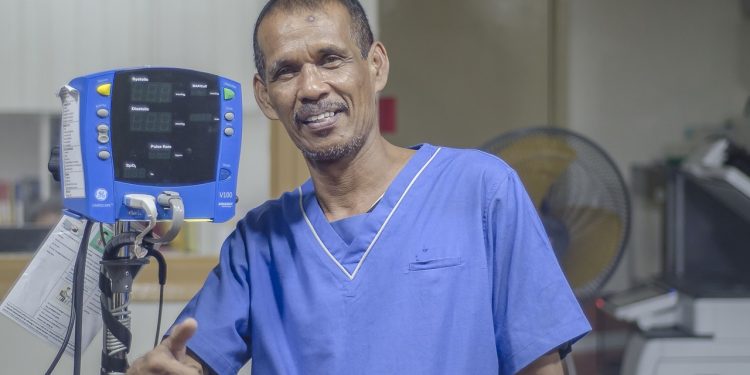When Ajis Jaafar first joined the Ministry of Health as a healthcare attendant 33 years ago in 1985, it was a means to getting a better life.
“I only had a Primary 6 education and it was not easy to secure a permanent job. I started thinking about getting married, so I joined the healthcare service as a chance to get a stable long-term job and buy a HDB flat,” recalled the 56-year-old father of six.
Ajis recalled being quite scared on his first day because his role as a healthcare attendant involved working with mental patients at the old View Road Hospital. But after getting used to the environment and understanding the patients’ and the conditions they suffered from better, the fears dissipated and he realised just how they were just like anyone else.
Just in case you were wondering, the View Road Hospital was a little-known mental institution located in Admiralty and operated by the Ministry of Health between 1975 and 2001 to address overcrowding in Woodbridge Hospital. When the hospital was decommissioned in 2001, Ajis was transferred to the present Institute of Mental Health (IMH) facility in Buangkok.
Levelling Up
Besides being proactive at work, Ajis has also attended a variety of courses, talks and sharing sessions over the years to help him do his job better.
Ajis successfully completed the Skills Upgrading Programme implemented by IMH in 2016 and gained a promotion from healthcare attendant to healthcare assistant. He also enjoyed a pay increment that has allowed him to better support his children.
Part of the Healthcare Industry Transformation Map, the programme was supported by the Healthcare Services Employees’ Union (HSEU) and NTUC’s e2i (Employment and Employability Institute). Besides in-house training, he also received on-the-job training.
Prior to his promotion, Ajis was only responsible for supporting the nursing staff in the delivery of patient care and cleanliness of the environment.
With the promotion, his role has expanded to include clinical duties such as recording blood pressure, temperature and heart rate.
“Now that I am a healthcare assistant, I am using some of the medical instruments to support the nurses. I may not have had the knowledge before, but I am learning how to use the machines effectively to take blood pressure, interpret the readings and be able to recognise symptoms that may require attention,” he shared.
Whenever he is free on shift, Ajis spends the time learning how to key in results of the clinical readings into the computer system.
“I want to learn and be better so that I can better support my team and do my best for my patients,” he said.
Good To Know
Ajis may have benefitted from the Skills Upgrading Programme implemented by his workplace at the Institute of Mental Health. But there are other avenues to pick up essential healthcare skills that can help make a difference in your career.

